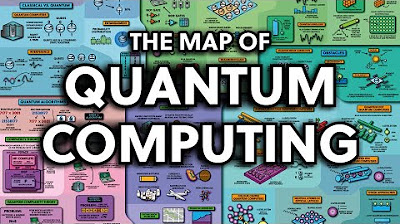Quantum Computing: What, Why, and What for
Summary
TLDRThis presentation on quantum computing delves into its fundamental principles and applications. It explains how quantum computers leverage quantum mechanics—particularly superposition and entanglement—to process information in ways that classical computers cannot. The speaker discusses the advantages of quantum computing, including its potential for solving complex problems faster and more efficiently, while also addressing challenges like hardware limitations and noise sensitivity. With diverse implementations being explored, the future of quantum computing looks promising, offering significant advancements in computation and problem-solving capabilities.
Takeaways
- 🧠 Quantum Computing leverages quantum mechanics phenomena such as superposition, entanglement, and randomness to process information more efficiently than classical computing.
- 🔢 Unlike classical bits, qubits can exist in a superposition of states, allowing them to represent multiple values simultaneously, which enhances computational power.
- ⚛️ Entanglement is a crucial aspect of quantum computing, enabling qubits to be interconnected in ways that can exponentially increase processing capabilities.
- 💡 Quantum computing does not guarantee solutions for all problems; it is effective only for specific problem classes where it can achieve significant advantages.
- 🚀 Quantum advantage and quantum supremacy refer to the scenarios where quantum computers outperform classical computers for particular problems.
- 🔋 Quantum Computing offers a potential solution to limitations in classical hardware, especially as traditional transistor scaling faces challenges.
- ⏳ Quantum algorithms can solve complex problems that classical computers cannot manage within feasible timeframes, such as factoring large prime numbers.
- 🌍 Energy efficiency is a vital consideration in computation; quantum computing may offer reversible computing methods that reduce energy dissipation.
- 🔬 Various physical systems can be used to build quantum computers, including superconductors, ions, and photons, each with unique advantages.
- 🛠️ The future of quantum computing involves developing universal quantum computers that can integrate various computational models while overcoming noise and error correction challenges.
Q & A
What is quantum computing?
-Quantum computing is a technology that harnesses the principles of quantum mechanics to process information using quantum bits (qubits), which can exist in multiple states simultaneously due to superposition.
How does quantum computing differ from classical computing?
-In classical computing, information is processed using bits that can be either 0 or 1. In contrast, quantum computing uses qubits that can represent both 0 and 1 at the same time, allowing for more complex and faster computations.
What are some key phenomena that quantum computing exploits?
-Quantum computing takes advantage of phenomena such as superposition, entanglement, and intrinsic randomness to manipulate and process information in ways that classical computers cannot.
What is the significance of entanglement in quantum computing?
-Entanglement allows qubits to be linked together, meaning the state of one qubit can depend on the state of another, enabling exponential increases in processing power compared to classical bits.
Why is quantum computing considered to have the potential for exponential speedup?
-Quantum computers can process many possible states simultaneously due to superposition and entanglement, which can lead to significantly faster solutions for certain problems compared to classical computing methods.
What are some problems that quantum computing might solve more efficiently than classical computers?
-Quantum computing can potentially solve complex problems such as factoring large prime numbers, optimizing complex systems, and simulating quantum systems more efficiently than classical computers.
What are the hardware limitations of classical computing that quantum computing aims to address?
-As transistors become miniaturized, classical computing faces challenges such as power leakage, increased heat generation, and limits on processing speed, which quantum computing could help overcome.
What is the role of energy in computation as it relates to quantum computing?
-Quantum computing can perform computations in a reversible manner, reducing energy dissipation compared to irreversible computations in classical computing, which is critical as energy requirements exceed global production.
How do quantum computers utilize various physical systems?
-Quantum computers can be built using a variety of physical systems, including superconductors, trapped ions, photons, and other quantum materials, each offering unique advantages for computation.
What are some current challenges facing quantum computing technology?
-Current challenges include noise and errors from environmental interactions, the need for error correction, and the development of scalable, universal quantum computers that can outperform classical systems.
Outlines

Этот раздел доступен только подписчикам платных тарифов. Пожалуйста, перейдите на платный тариф для доступа.
Перейти на платный тарифMindmap

Этот раздел доступен только подписчикам платных тарифов. Пожалуйста, перейдите на платный тариф для доступа.
Перейти на платный тарифKeywords

Этот раздел доступен только подписчикам платных тарифов. Пожалуйста, перейдите на платный тариф для доступа.
Перейти на платный тарифHighlights

Этот раздел доступен только подписчикам платных тарифов. Пожалуйста, перейдите на платный тариф для доступа.
Перейти на платный тарифTranscripts

Этот раздел доступен только подписчикам платных тарифов. Пожалуйста, перейдите на платный тариф для доступа.
Перейти на платный тарифПосмотреть больше похожих видео

The Map of Quantum Computing - Quantum Computing Explained

క్వాంటం సైన్స్ తో కంప్యూటర్ విప్లవం ఎలా ? || Computer Revoluation With Quantam Science ||

Quantum Computing Expert Explains One Concept in 5 Levels of Difficulty | WIRED

Quantum Mechanics for Dummies

Quantum Computers, Explained With Quantum Physics

mod02lec12 - Quantum Computing Concepts: Entanglement and Interference - Part 2
5.0 / 5 (0 votes)
